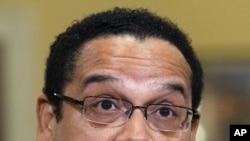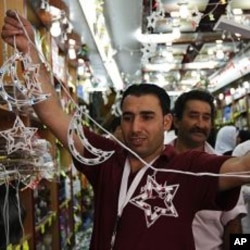Most Muslims around the world will start the fasting month of Ramadan on Monday, August 1. In America, Muslims have been conducting a series of events to welcome the holy month of Ramadan. But, according to a U.S. Congressman, Islam still is mostly misunderstood in the United States.
Keith Ellison, a member of the House of Representatives from the midwestern state of Minnesota delivered greetings on the fasting month.
Islam is still much misunderstood
Ellison took office in January, 2007, and became the first Muslim to be elected to the U.S. Congress. He was first elected in November of 2006, just five years after the 9/11 terrorist attacks. He has won re-election twice since then.
Keith Ellison is one of the many faces of Muslims in America. As a pioneer in his profession, many people ask how his fellow members of Congress on Capitol Hill treat him. In a recent panel discussion “Muslims in America” held by the Faith and Politics Institute at the Newseum in Washington, Ellison answered that question:
"I want to assure you that I have been well treated, well received. Well respected by my colleagues," he said.
Islam, Ellison acknowledged, is still much misunderstood. But, he asserts, Islam in America is not something new. Islam has been in America for 14 generations. He regrets though, that throughout the world, people treated religion as their identity and are willing to kill or die over the identity associated with religion, not the faith, but religious identity.
"If you use your religion as an identity as opposed to a path to divine, inspirations and guidance, then you are no different than Crips and Bloods [gangs]," he said. "And I want to say that I mean that."
Make this world a better place
Surveys show that about 60 percent of Americans do not understand Islam. To further introduce Islam, Ellison argued, the Muslim community in America should be much more vocal about who they really are, then take actions in their chosen field.
"If you can make a movie, make one. If you could sing a song, sing it. If you could write a play, write it. If you want to run for office - run, but do something to make this world a better place" said Ellison. "And then we don’t even have to worry about what religion we are because we [will] all be united in what we believe, which is service to humanity."
His argument is echoed by Wajahat Ali, a man of Pakistani descent, a playwright and theater director, who was born and raised near the city of San Francisco in the western state of California. His works, in particular, The Domestic Crusaders, gained lots of attention.
Remake of history
What is happening to Muslims in America nowadays, according to Wajahat Ali, is a “remake of history with new characters." Looking back, he recalls, Jews, Blacks, Americans of Japanese and Italian descent have had similar experiences. He believes homosexuals are under the same type of scrutiny now.
Meanwhile, Hussein Rashid, a lecturer and a Muslim activist in New York, regrets that not many Muslim leaders have emerged lately. He believes it is because Muslims are not good at telling their stories.
Muslims are not good at telling their stories
Rashid also regrets that many Muslims try to fit in their environment because they do not want to appear as a Muslim. In fact, he said, it is okay to be different, and that Muslims have many similarities with people of other religions in America. So, he adds, Muslims or non-Muslims, we are all Americans, and we need to promote equality and respect for diversity.
Another panelist was an independent filmmaker who has spent years working for Hollywood movie industries, Lena Khan. Through her short movie A Land Called Paradise she states that Muslims in America are just like other Americans. She says we also shop at Victoria's Secret, are fans of Justin Timberlake, and fall in love.
But, she states, it is our choice to be away from alcoholic beverages that cause one death every 31 minutes, not to commit adultery, and, for Muslim women, to wear hijab.
Ellison, Khan, Ali and Rashid all urge Muslims to do something in their respective fields to make a better world. In addition, Keith Ellison calls on Muslims to serve the community. Wajahat Ali asks Muslims to do something for all so that we can learn from each other. Meanwhile, Hussein Rashid calls on Muslims to raise their "voice" and deliver a story that can be shared.
It was the first panel discussion of its kind held at the Newseum and it was just days before Muslims start their Ramadan.
The Fiqh Council of North America sets Ramadan to begin on Monday, August 1. The fasting month comes when the Americans are debating the debt ceiling, the Middle East regions are still in turbulence, and Muslims in Somalia are suffering from a severe famine due to drought.
Still Keith Ellison says, no matter what is happening in the world he wants to express his wish for a blessed Ramadan for all Muslims anywhere in the world.





